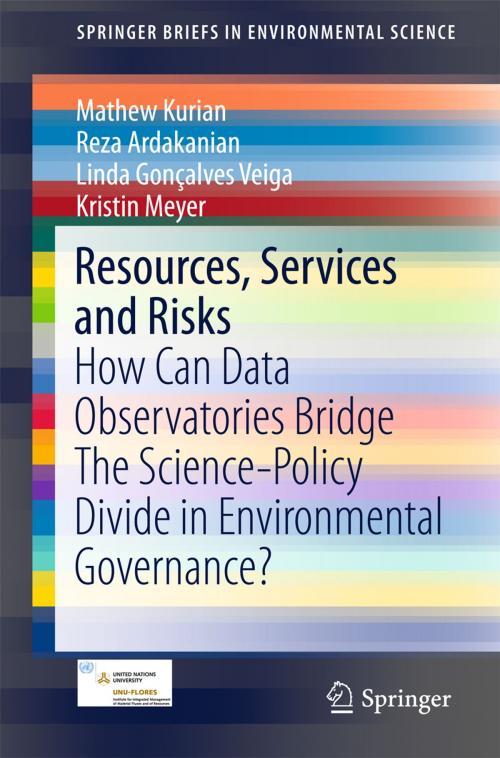Resources, Services and Risks
How Can Data Observatories Bridge The Science-Policy Divide in Environmental Governance?
Nonfiction, Science & Nature, Technology, Remote Sensing, Agriculture & Animal Husbandry, Science| Author: | Mathew Kurian, Reza Ardakanian, Linda Gonçalves Veiga, Kristin Meyer | ISBN: | 9783319287065 |
| Publisher: | Springer International Publishing | Publication: | January 11, 2016 |
| Imprint: | Springer | Language: | English |
| Author: | Mathew Kurian, Reza Ardakanian, Linda Gonçalves Veiga, Kristin Meyer |
| ISBN: | 9783319287065 |
| Publisher: | Springer International Publishing |
| Publication: | January 11, 2016 |
| Imprint: | Springer |
| Language: | English |
This book discusses the role of observatories in supporting evidence-based decision-making. The book focuses on issues of data accessibility, monitoring frameworks and governance processes with regard to environmental resources – water, soil and waste. This publication highlights challenges related to policy-implementation measures and examines current monitoring approaches, and illustrates how the UNU-FLORES Nexus Observatory seeks to overcome concerns related to data, monitoring and governance of water, soil and waste resources. In particular, given that extreme weather events such as droughts and floods are predicted to become more frequent in the future, it discusses the need for improved hazard risk monitoring. It proposes risk indices for drought and floods, which measure exposure and vulnerability to the phenomena through a multitude of bio-physical, socio-economic and institutional indicators. Furthermore, the potential for using openly accessible data made available through observatories in decision-making aimed at improving food security is also discussed. It acknowledges governments as key players in environmental resource management, and recognizes that decentralization reforms, as well as the emergence of information and communication technologies, have significantly changed the role of governments in promoting sustainable development. The book is particularly relevant for decision-makers, donor agencies, practitioners and students with an interest in environmental management who are also keen followers of discussions on the post-2015 monitoring agenda.
This book discusses the role of observatories in supporting evidence-based decision-making. The book focuses on issues of data accessibility, monitoring frameworks and governance processes with regard to environmental resources – water, soil and waste. This publication highlights challenges related to policy-implementation measures and examines current monitoring approaches, and illustrates how the UNU-FLORES Nexus Observatory seeks to overcome concerns related to data, monitoring and governance of water, soil and waste resources. In particular, given that extreme weather events such as droughts and floods are predicted to become more frequent in the future, it discusses the need for improved hazard risk monitoring. It proposes risk indices for drought and floods, which measure exposure and vulnerability to the phenomena through a multitude of bio-physical, socio-economic and institutional indicators. Furthermore, the potential for using openly accessible data made available through observatories in decision-making aimed at improving food security is also discussed. It acknowledges governments as key players in environmental resource management, and recognizes that decentralization reforms, as well as the emergence of information and communication technologies, have significantly changed the role of governments in promoting sustainable development. The book is particularly relevant for decision-makers, donor agencies, practitioners and students with an interest in environmental management who are also keen followers of discussions on the post-2015 monitoring agenda.















